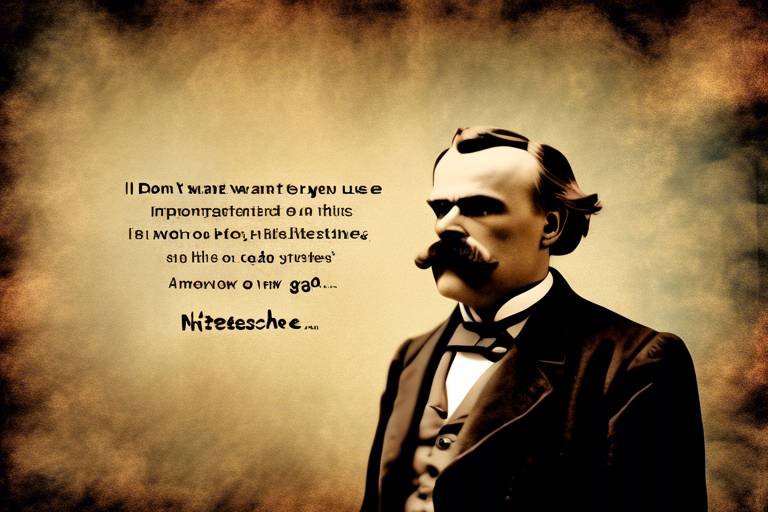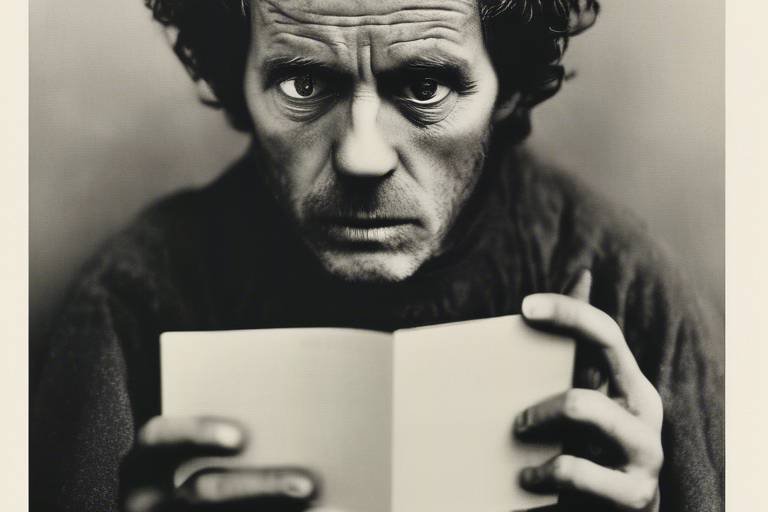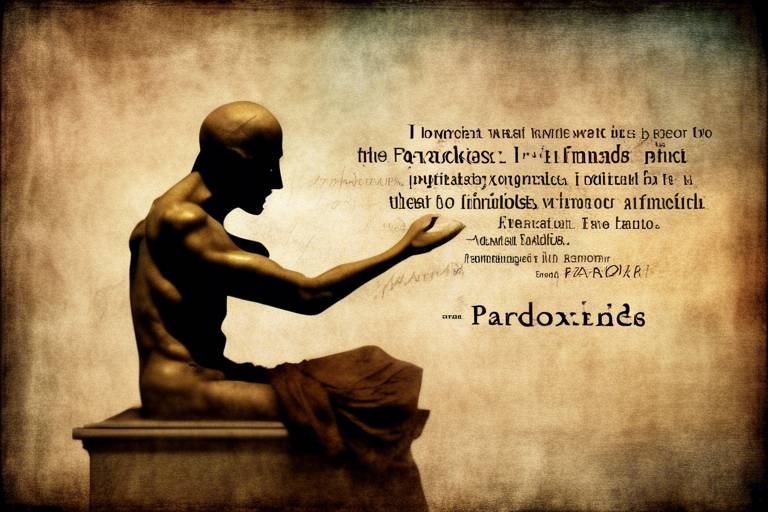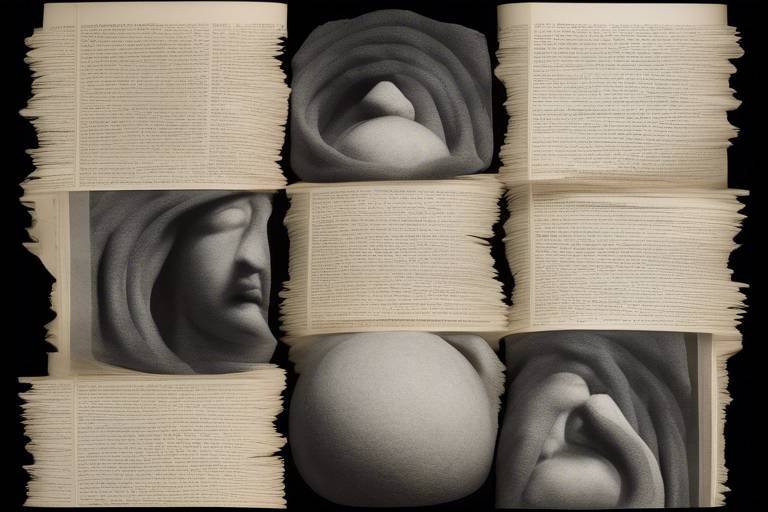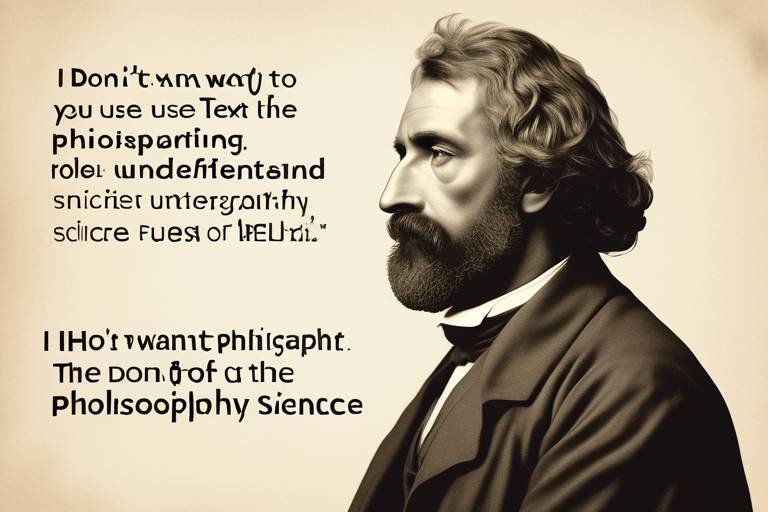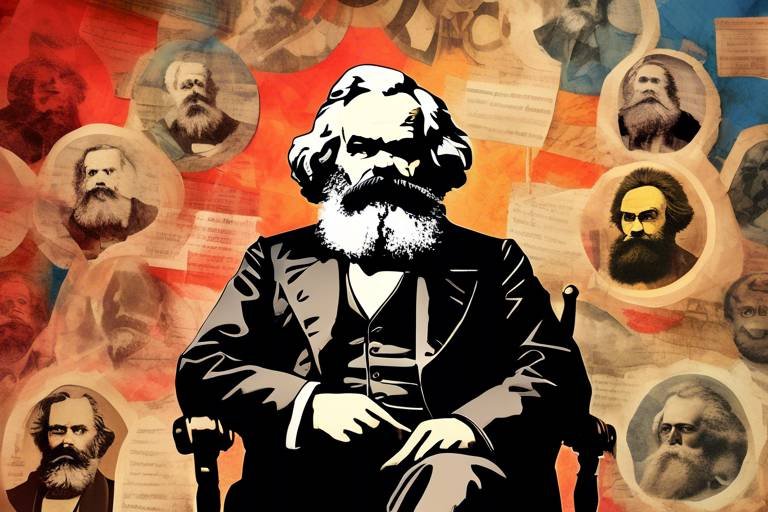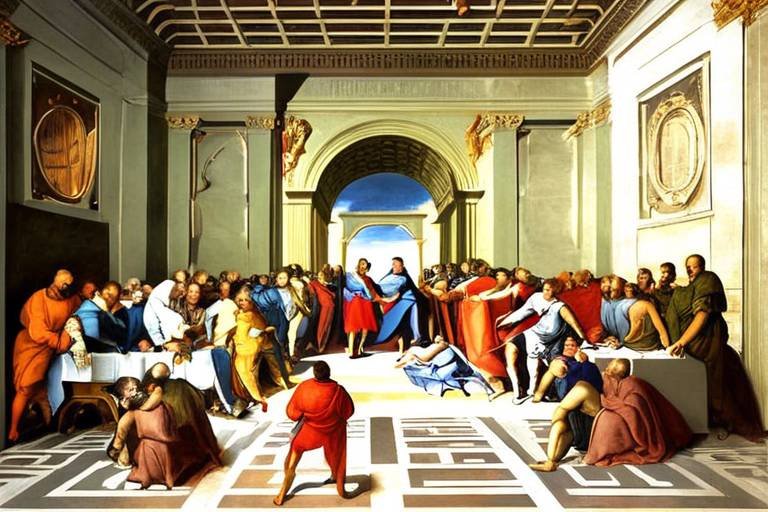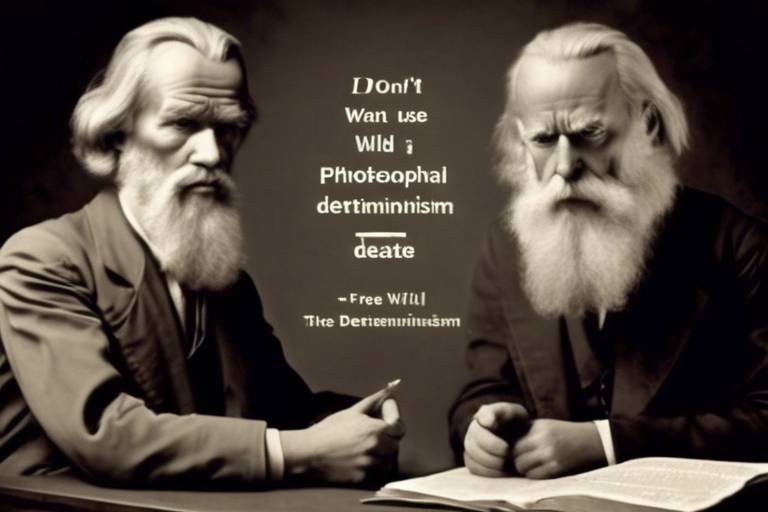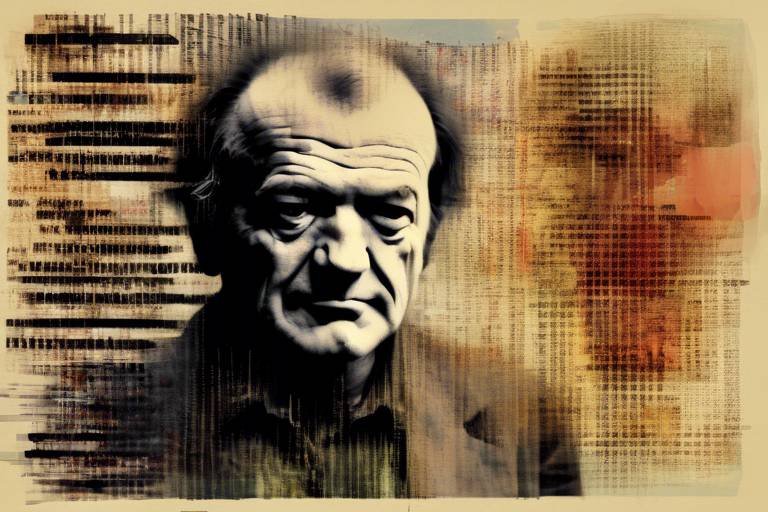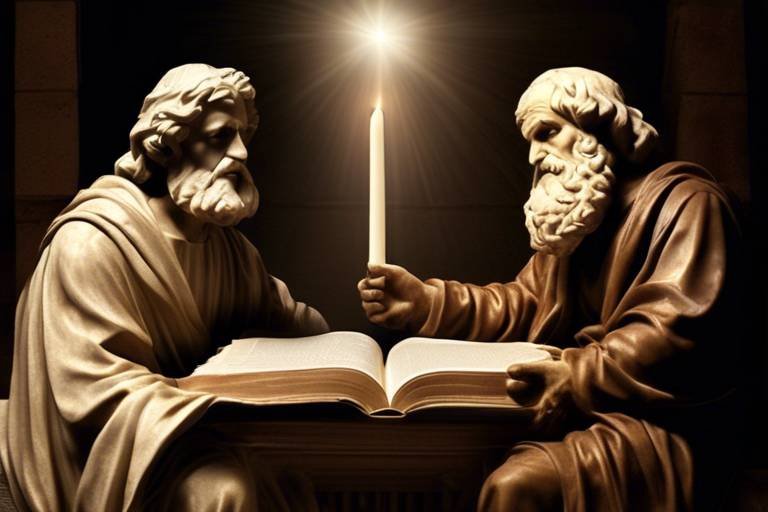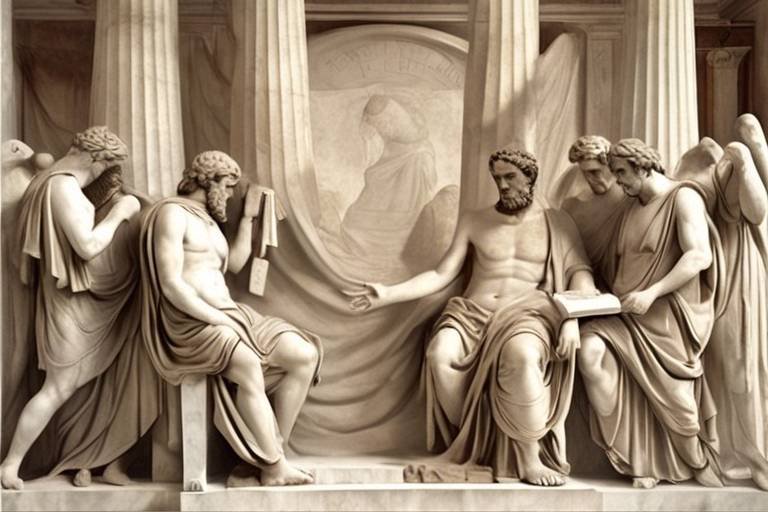253 Nietzsche's View on God: An Overview
Friedrich Nietzsche, a towering figure in philosophy, dramatically reshaped our understanding of morality, religion, and the human condition. His provocative ideas challenge the very fabric of traditional beliefs, inviting us to rethink our relationship with the divine. At the heart of Nietzsche's philosophy lies the bold assertion that God is dead, a statement that reverberates through his works and ignites intense debate. This article delves into Nietzsche's multifaceted perspectives on God, exploring his critiques of organized religion, the revolutionary concept of the Übermensch, and the profound implications of his philosophy in a world increasingly defined by secularism.
Nietzsche's proclamation of the death of God is not merely a statement about the existence of a deity; it symbolizes the decline of traditional religious beliefs in modern society. With the rise of science and reason, Nietzsche argues that the comforting narratives provided by religion have lost their grip on the human psyche. This shift leads to a crisis of meaning, as individuals are left grappling with existential questions in a world devoid of divine authority. The implications are staggering: morality, purpose, and values must now be re-evaluated in light of this newfound freedom. But what does it mean to live in a godless world? Nietzsche challenges us to confront the void left by the absence of God and to forge our own paths in life.
Nietzsche's critiques primarily target organized religion, particularly Christianity. He argues that it promotes weakness and conformity, stifling the human spirit's potential for greatness. In his view, traditional religious doctrines often encourage self-denial and submissiveness rather than the celebration of life and individuality. This critique is not merely a rejection of faith; it is a call for a radical reevaluation of our values. Nietzsche believes that the moral frameworks established by religion can lead to a culture of mediocrity, where the strong are vilified, and the weak are exalted. He posits that true strength lies in the ability to embrace one's instincts and desires, to live authentically without the constraints imposed by dogma.
Central to Nietzsche's philosophy is the concept of the will to power, which he describes as the fundamental driving force behind human behavior. This idea transcends mere survival instincts; it embodies ambition, assertiveness, and the relentless pursuit of personal excellence. Nietzsche argues that individuals are not merely motivated by the desire to survive but are driven by a deeper need to assert their influence and creativity in the world. This perspective invites us to reconsider our motivations and aspirations. Are we acting out of fear and conformity, or are we embracing our potential to shape our destinies? The will to power encourages us to strive for greatness, to challenge ourselves and the status quo, and to seek out experiences that enrich our lives.
In his exploration of morality, Nietzsche contrasts master morality with slave morality. Master morality is characterized by strength, nobility, and the affirmation of life, while slave morality arises from weakness and resentment. This dichotomy shapes cultural values and ethics, influencing how societies develop their moral frameworks. Nietzsche argues that slave morality often seeks to undermine the powerful, promoting values that elevate the meek and the submissive. By recognizing this dynamic, we can begin to understand the underlying motivations behind our societal norms and challenge the values that may be holding us back. Are we living according to our true nature, or are we conforming to an imposed morality?
Nietzsche's views pose significant challenges to contemporary ethical frameworks. In a world where traditional religious values are losing their authority, he urges individuals to create their own values. This call for personal responsibility and authenticity invites us to reflect on our beliefs about good and evil. What if morality is not an absolute, but a construct shaped by our experiences and desires? Nietzsche's philosophy encourages us to embrace the chaos of existence and to craft our own ethical compass, grounded in our unique perspectives and aspirations. This radical approach to ethics can be liberating, but it also demands courage and introspection.
The concept of the Übermensch, or Overman, represents Nietzsche's vision of the ideal individual who transcends conventional morality and societal norms. This figure embodies creativity, strength, and self-actualization in a godless world. The Übermensch is not bound by the constraints of traditional values; instead, they forge their own path and create meaning in their lives. Nietzsche challenges us to aspire to this ideal, to embrace our individuality, and to cultivate our unique talents. In doing so, we can rise above the mediocrity that often plagues society and become the architects of our destinies.
Nietzsche places great emphasis on the importance of art and aesthetics as vital means of expressing human experience and creating meaning. In a world devoid of divine purpose, he views artistic endeavors as essential for overcoming nihilism. Art allows us to channel our emotions, confront our struggles, and celebrate the beauty of existence. It serves as a powerful antidote to the despair that can arise from the absence of religious meaning.
In the face of nihilism, Nietzsche argues that art offers a transformative power. It enables individuals to find purpose and beauty in existence, despite the absence of divine meaning. Through creative expression, we can confront the chaos of life and emerge with a renewed sense of hope. Art becomes a means of asserting our existence and celebrating our individuality, allowing us to connect with others and share our experiences.
Nietzsche's idea of eternal recurrence challenges us to live our lives as if we would have to relive them infinitely. This thought experiment prompts profound reflection on our choices and values. Are we living authentically, or are we simply going through the motions? The concept of eternal recurrence serves as a powerful reminder to embrace each moment fully and to make choices that resonate with our true selves. It encourages us to live with intention and to create a life we would be proud to relive.
- What does Nietzsche mean by "God is dead"? Nietzsche's declaration signifies the decline of traditional religious beliefs and the resulting crisis of meaning in modern society.
- How does Nietzsche's critique of religion differ from atheism? While both reject the existence of God, Nietzsche critiques organized religion for promoting weakness and conformity, advocating for the creation of personal values instead.
- What is the significance of the Übermensch? The Übermensch represents Nietzsche's ideal individual who transcends conventional morality and societal norms, embodying creativity and self-actualization.
- How does art relate to Nietzsche's philosophy? Nietzsche views art as a vital means of expressing human experience and creating meaning in a world devoid of divine purpose.

God is dead.
This article explores Friedrich Nietzsche's philosophical perspectives on God, examining his critiques of religion, the concept of the Übermensch, and the implications of his famous declaration that God is dead.
Nietzsche's proclamation of the death of God signifies the decline of traditional religious beliefs in modern society and its profound implications for morality and meaning in life. This bold statement is not merely a literal assertion but a metaphorical reflection of the cultural and philosophical shifts occurring in the 19th century. Imagine a world where the guiding force of divine authority has crumbled, leaving humanity to grapple with the void it creates. The implications are staggering—without a divine moral compass, individuals are left to navigate their own paths, often leading to a sense of existential dread. Nietzsche argues that this 'death' is not just a loss but an opportunity for liberation, allowing individuals to forge their own values and meanings.
Nietzsche's critiques target organized religion, particularly Christianity, which he argues promotes weakness and conformity rather than strength and individuality. He believed that traditional religious structures stifle human potential and creativity, leading to a culture that values mediocrity over excellence. In his view, religion often encourages people to accept their suffering and limitations instead of striving for greatness. His broader philosophical views challenge us to question the morals and values we inherit from these institutions. Are they truly our own, or merely a product of societal conditioning? By dismantling these constructs, Nietzsche invites us to embrace a more authentic existence.
Central to Nietzsche's philosophy, the will to power reflects his belief in the fundamental driving force behind human behavior, emphasizing ambition, assertiveness, and the pursuit of personal excellence. This concept posits that life is not merely about survival or reproduction but about the expression of power and creativity. The will to power is not just a desire for domination over others; rather, it is an internal drive to overcome obstacles and to achieve one's fullest potential. In a world where God is dead, this drive becomes even more crucial as individuals seek to create meaning and purpose in their lives.
Nietzsche contrasts master morality, characterized by strength and nobility, with slave morality, which he believes arises from weakness and resentment. Master morality values pride, strength, and nobility, while slave morality, born out of oppression, values humility, empathy, and meekness. This dichotomy shapes cultural values and ethics, leading to a reevaluation of what constitutes good and evil. In Nietzsche's eyes, the ascendance of slave morality has led to a culture that suppresses the strong in favor of the weak. This moral inversion, he argues, stifles human potential and creativity.
Nietzsche's views challenge contemporary ethical frameworks, prompting a reevaluation of concepts like good and evil. He urges individuals to create their own values in a post-religious world, suggesting that morality should not be dictated by external authorities but should stem from individual experience and perspective. This radical approach encourages a personal journey of self-discovery, where one must confront their beliefs and redefine their understanding of right and wrong. As we navigate this complex landscape, the question arises: how do we establish a moral framework that reflects our true selves?
The concept of the Übermensch represents Nietzsche's ideal individual who transcends conventional morality and societal norms. This figure embodies creativity, strength, and self-actualization in a godless world. The Übermensch is not merely a superhuman but someone who has the courage to define their own existence and values. In a sense, they are the architects of their own destiny, unbound by the constraints of traditional morality. This idea serves as an inspiration for individuals to rise above societal expectations and to embrace their unique path.
Nietzsche emphasizes the importance of art and aesthetics as means of expressing human experience and creating meaning. He views artistic endeavors as vital to overcoming nihilism, suggesting that art can fill the void left by the absence of divine meaning. Through art, individuals can explore the depths of their emotions, confront their existential fears, and ultimately find beauty in the chaos of existence. This perspective invites us to consider: how can we use creativity to navigate our own lives?
In the face of nihilism, Nietzsche argues that art offers a transformative power, enabling individuals to find purpose and beauty in existence despite the absence of divine meaning. Art becomes a refuge, a way to express the inexpressible and to confront the harsh realities of life. It allows us to channel our experiences, emotions, and thoughts into something tangible, creating a sense of connection with ourselves and others. In this way, art serves as a beacon of hope in a seemingly indifferent universe.
The idea of eternal recurrence challenges individuals to live their lives as if they would have to relive them infinitely. This thought experiment encourages a profound reflection on choices and values, prompting us to consider whether we would be content with our lives if we had to repeat them over and over again. It forces us to confront our decisions and to evaluate what truly matters. Would we continue on our current path, or would we strive for something greater? This concept serves as a powerful reminder of the importance of living authentically and deliberately.
- What does Nietzsche mean by "God is dead"? Nietzsche's declaration signifies the decline of traditional religious beliefs and the implications for morality and meaning in life.
- How does Nietzsche view organized religion? He critiques organized religion, especially Christianity, for promoting weakness and conformity rather than strength and individuality.
- What is the will to power? It is Nietzsche's concept that describes the fundamental driving force behind human behavior, emphasizing ambition and the pursuit of personal excellence.
- What is the Übermensch? The Übermensch is Nietzsche's ideal individual who transcends conventional morality and societal norms, embodying creativity and self-actualization.
- How does art relate to Nietzsche's philosophy? Nietzsche views art as a vital means of creating meaning and overcoming nihilism, allowing individuals to express their experiences and emotions.

This article explores Friedrich Nietzsche's philosophical perspectives on God, examining his critiques of religion, the concept of the Übermensch, and the implications of his famous declaration that God is dead.
Nietzsche's proclamation of the death of God signifies the decline of traditional religious beliefs in modern society and its profound implications for morality and meaning in life. This statement isn't merely a critique of religious institutions; it's a reflection of the changing landscape of human thought. As society progresses, the once unshakeable foundations of faith are questioned, leading to a spiritual vacuum. This vacuum, Nietzsche argues, leaves individuals grappling with existential questions about purpose and morality. Without a divine moral compass, how do we navigate our lives? This is where Nietzsche's philosophy becomes critical, as he invites us to forge our own paths in a world devoid of absolute truths.
Nietzsche's critiques target organized religion, particularly Christianity, which he argues promotes weakness and conformity rather than strength and individuality. He believed that traditional religious frameworks stifle human potential and creativity. Instead of encouraging individuals to rise above their circumstances, organized religion often reinforces a sense of guilt and submission. Nietzsche's broader philosophical views stem from this critique, as he champions the idea of self-overcoming and personal excellence. He asks us to consider: are we living authentically, or are we merely adhering to societal norms dictated by outdated dogmas?
Central to Nietzsche's philosophy, the will to power reflects his belief in the fundamental driving force behind human behavior. It emphasizes ambition, assertiveness, and the pursuit of personal excellence. Rather than viewing life through the lens of morality imposed by external authorities, Nietzsche encourages us to see life as a canvas for our own desires and aspirations. This concept challenges us to harness our inner strength and creativity, suggesting that true fulfillment comes from the relentless pursuit of our goals and the courage to assert our will.
Nietzsche contrasts master morality, characterized by strength and nobility, with slave morality, which he believes arises from weakness and resentment. Master morality values qualities such as power, pride, and nobility, while slave morality arises from the oppressed and values humility, sympathy, and meekness. This dichotomy shapes the cultural values and ethics we see today. Nietzsche argues that the dominance of slave morality has led to a culture that often glorifies mediocrity and punishes excellence. He challenges us to reconsider which values we embrace and whether they truly reflect our strongest selves.
Nietzsche's views challenge contemporary ethical frameworks, prompting a reevaluation of concepts like good and evil. In a world where traditional religious ethics are waning, he urges individuals to create their own values in a post-religious context. This call to action can be both liberating and daunting. It requires a profound level of introspection and courage to define one's own moral compass. As we navigate modern life, we must ask ourselves: what values do we hold dear, and how do they reflect our true selves?
The concept of the Übermensch represents Nietzsche's ideal individual who transcends conventional morality and societal norms. The Übermensch embodies creativity, strength, and self-actualization in a godless world. This figure is not merely an overachiever but someone who redefines existence by creating their own values and meaning. In a society that often seeks to impose conformity, the Übermensch stands as a beacon of individuality and self-determination. Nietzsche's vision challenges us to aspire to this ideal, to break free from the chains of societal expectations, and to live authentically.
Nietzsche emphasizes the importance of art and aesthetics as means of expressing human experience and creating meaning. He views artistic endeavors as vital to overcoming nihilism. In a world where traditional values are in decline, art becomes a sanctuary where individuals can explore their deepest emotions and thoughts. Through art, we can confront the chaos of existence and find beauty in the mundane. Nietzsche believed that the creative process is not just a form of expression but a way to assert our will and find purpose.
In the face of nihilism, Nietzsche argues that art offers a transformative power. It enables individuals to find purpose and beauty in existence despite the absence of divine meaning. Art becomes a medium through which we can explore the depths of human experience and assert our individuality. Whether through literature, music, or visual arts, creative expression allows us to confront the void and emerge with a renewed sense of purpose. In this way, art serves as both a refuge and a rallying cry for those seeking meaning in a seemingly indifferent universe.
The idea of eternal recurrence challenges individuals to live their lives as if they would have to relive them infinitely. This thought experiment prompts a profound reflection on choices and values. If you had to experience your life over and over again, would you change anything? Would you embrace your current existence, or would you seek to alter your path? Nietzsche uses this concept to encourage us to live deeply and authentically, making choices that resonate with our true selves. It’s a call to action that asks us to examine our lives and strive for a life worth reliving.
- What does Nietzsche mean by "God is dead"?
Nietzsche's statement signifies the decline of traditional religious beliefs and the implications of this loss for morality and meaning in modern life. - How does Nietzsche view organized religion?
He critiques organized religion, particularly Christianity, for promoting weakness and conformity rather than strength and individuality. - What is the concept of the Übermensch?
The Übermensch is Nietzsche's ideal individual who creates their own values and transcends conventional morality. - Why is art important in Nietzsche's philosophy?
Art provides a means of overcoming nihilism and expressing human experience, allowing individuals to find purpose and beauty in existence. - What is the eternal recurrence?
This idea challenges individuals to live as if they would have to relive their lives infinitely, prompting reflection on choices and values.

The Death of God
Friedrich Nietzsche's proclamation that "God is dead" is one of the most provocative statements in modern philosophy. This declaration does not indicate a literal death but symbolizes the decline of traditional religious beliefs in a rapidly evolving society. As humanity progresses through the ages, Nietzsche observed that the once-unquestioned authority of religion, especially Christianity, has significantly weakened. This shift raises profound questions about morality, purpose, and the very fabric of our existence.
By declaring the death of God, Nietzsche was not merely making a statement about the diminishing role of religion; he was also highlighting the **void** left in its absence. With the collapse of these age-old beliefs, individuals are left grappling with the implications for their moral compass and sense of meaning. In a world where divine guidance is no longer a given, how do we navigate our lives? This existential crisis is not just a philosophical concern; it is a deeply personal one that resonates with many in contemporary society.
Nietzsche's assertion invites us to consider several critical points:
- Morality without God: If God is no longer the source of moral authority, then what becomes of our ethical standards? Nietzsche urges us to create our own values, leading to a more authentic existence.
- The Rise of Nihilism: The absence of a divine framework can lead to nihilism, the belief that life lacks inherent meaning. Nietzsche recognized this peril and sought to counter it with his philosophy of the Übermensch.
- Personal Responsibility: With the death of God, individuals must take responsibility for their actions and decisions, shaping their own destinies without relying on external validation.
Ultimately, Nietzsche's declaration serves as a wake-up call. It challenges us to confront the realities of a godless world and to seek meaning in our own experiences. Rather than succumbing to despair, Nietzsche encourages us to embrace the freedom this new reality offers. It is a call to arms for those willing to forge their own paths, to become creators of their own values, and to find strength in individuality.
In conclusion, the death of God is not merely an end; it is also a beginning. It compels us to reexamine our beliefs, to question societal norms, and to engage in a personal journey toward self-discovery and empowerment. As we navigate this complex landscape, Nietzsche's insights remain profoundly relevant, pushing us to explore the depths of our humanity and the potential for greatness that lies within each of us.

death of God
This article explores Friedrich Nietzsche's philosophical perspectives on God, examining his critiques of religion, the concept of the Übermensch, and the implications of his famous declaration that God is dead.
Nietzsche's proclamation of the is not merely a statement about the existence of a deity; it symbolizes a seismic shift in the foundations of Western thought. This declaration encapsulates the decline of traditional religious beliefs in modern society, suggesting that the Enlightenment and the rise of scientific reasoning have rendered the concept of God obsolete. Imagine walking through a once-vibrant marketplace of ideas, only to find it deserted—this is the essence of Nietzsche's thought. The absence of God leaves a profound void, leading to existential questions about morality, purpose, and the very fabric of meaning in life.
As Nietzsche famously stated, "God is dead," he wasn't celebrating this demise; rather, he was lamenting the loss of a moral compass that had guided humanity for centuries. This idea raises the question: without God, what becomes of our moral values? In a world where divine authority no longer reigns, individuals are left to grapple with the implications of a godless existence. The challenge is not merely to accept the absence of God but to confront the freedom and responsibility that comes with it. This freedom can be both exhilarating and terrifying, akin to standing at the edge of a cliff, peering into the vast unknown.
Moreover, Nietzsche's exploration of the death of God leads to a critical examination of how societies construct meaning in the absence of divine guidance. He argues that traditional morality, particularly that of Christianity, promotes weakness and conformity, stifling the human spirit. Instead, Nietzsche advocates for a re-evaluation of values, urging individuals to embrace their instincts and desires. This shift is vital for personal growth and self-actualization, as it allows individuals to break free from the chains of imposed morality and create their own values.
In essence, the death of God is a call to action. It challenges us to rise above nihilism and engage in a quest for meaning that is authentic and self-determined. Nietzsche invites us to become the architects of our own lives, to create purpose where none is given. This is where the concept of the Übermensch emerges, representing an individual who transcends conventional morality and societal norms, embodying strength, creativity, and self-actualization in a world devoid of divine oversight.
- What does Nietzsche mean by "God is dead"? Nietzsche's statement signifies the decline of traditional religious beliefs and the implications of living in a world without a divine moral framework.
- How does the death of God affect morality? It challenges individuals to create their own values and redefine morality in a post-religious context.
- What is the Übermensch? The Übermensch, or Overman, is Nietzsche's ideal individual who transcends societal norms and embodies creativity and strength.
- Why is art important in Nietzsche's philosophy? Art serves as a means of expressing human experience and creating meaning in a world that may feel nihilistic.
- What is the eternal recurrence? The eternal recurrence is a thought experiment that encourages individuals to live their lives as if they would have to relive them infinitely, prompting reflection on choices and values.

signifies the decline of traditional religious beliefs in modern society and its profound implications for morality and meaning in life.
This article explores Friedrich Nietzsche's philosophical perspectives on God, examining his critiques of religion, the concept of the Übermensch, and the implications of his famous declaration that God is dead.
Nietzsche's proclamation of the death of God signifies the decline of traditional religious beliefs in modern society and its profound implications for morality and meaning in life. This declaration is not merely a statement about the existence of a deity; rather, it encapsulates a seismic shift in the way humanity perceives its place in the universe. As society moves away from the comforting narratives provided by religion, individuals are left grappling with existential questions that were once neatly answered by faith. How do we find meaning in a world devoid of divine oversight? What moral compass guides us when the absolutes of religion crumble?
This decline in religious belief leads to a landscape where values are no longer dictated by a higher power but are instead shaped by individual experiences and societal interactions. Nietzsche argues that this shift liberates individuals, allowing them to forge their own paths and create personal values. However, it also introduces a sense of nihilism—the belief that life lacks inherent meaning or purpose. In this new reality, the absence of God can feel like a void, prompting feelings of despair and confusion.
To illustrate this concept, consider the following implications:
- Morality becomes subjective: Without a divine lawgiver, ethical standards can vary dramatically from person to person, leading to a more pluralistic society.
- Search for meaning: Individuals must actively seek out their own purposes, which can be both liberating and daunting.
- Rise of existentialism: Philosophers and thinkers begin to explore human existence, freedom, and choice in a godless universe.
As Nietzsche delves deeper into these themes, he emphasizes the importance of acknowledging this new reality. Embracing the death of God means confronting the uncomfortable truths about existence, and it requires a radical rethinking of ethics and values. It challenges individuals to become the architects of their own lives, pushing them to cultivate a sense of purpose that is not reliant on external validation.
Nietzsche's critiques target organized religion, particularly Christianity, which he argues promotes weakness and conformity rather than strength and individuality, influencing his broader philosophical views.
Central to Nietzsche's philosophy, the will to power reflects his belief in the fundamental driving force behind human behavior, emphasizing ambition, assertiveness, and the pursuit of personal excellence.
Nietzsche contrasts master morality, characterized by strength and nobility, with slave morality, which he believes arises from weakness and resentment, shaping cultural values and ethics.
Nietzsche's views challenge contemporary ethical frameworks, prompting reevaluation of concepts like good and evil, and urging individuals to create their own values in a post-religious world.
The concept of the Übermensch represents Nietzsche's ideal individual who transcends conventional morality and societal norms, embodying creativity, strength, and self-actualization in a godless world.
Nietzsche emphasizes the importance of art and aesthetics as means of expressing human experience and creating meaning, viewing artistic endeavors as vital to overcoming nihilism.
In the face of nihilism, Nietzsche argues that art offers a transformative power, enabling individuals to find purpose and beauty in existence despite the absence of divine meaning.
The idea of eternal recurrence challenges individuals to live their lives as if they would have to relive them infinitely, prompting a profound reflection on choices and values.
- What does Nietzsche mean by "God is dead"? This phrase signifies the decline of traditional religious beliefs and the challenges of finding meaning in a secular world.
- How does Nietzsche's view impact modern ethics? Nietzsche's philosophy encourages individuals to create their own values rather than rely on religious or societal norms.
- What is the Übermensch? The Übermensch is Nietzsche's ideal individual who transcends conventional morality and embodies creativity and strength.
- How does art relate to Nietzsche's philosophy? Nietzsche views art as a crucial means for individuals to find meaning and beauty in life, especially in the face of nihilism.

Critique of Religion
Friedrich Nietzsche's critique of religion, particularly organized religion such as Christianity, is a cornerstone of his philosophical outlook. He argues that traditional religious beliefs foster a culture of weakness and conformity, stifling the human spirit and individuality. To Nietzsche, the doctrines of Christianity promote a morality that values humility and submissiveness over strength and assertiveness. This perspective is not merely a rejection of religious practices but a profound challenge to the very foundations of societal values.
Nietzsche believed that organized religion undermines true human potential by instilling a sense of guilt and sinfulness. Instead of celebrating life and its inherent struggles, religion often encourages individuals to view their existence as a burden, filled with suffering and penance. In his view, this leads to a society that is risk-averse and fearful of embracing the full spectrum of human experience. He famously stated that Christianity was a religion of the weak, promoting values that arise from resentment and a desire for revenge against the strong.
One of the most striking elements of Nietzsche's critique is his concept of slave morality. He contrasts this with what he terms master morality, which he believes is rooted in strength, creativity, and nobility. Slave morality, on the other hand, arises from the oppressed and is characterized by values such as meekness and compassion. Nietzsche argues that this moral framework has become dominant in Western culture, leading to a decline in the appreciation for the noble and the powerful.
To illustrate this dichotomy, consider the following table that summarizes the key differences between master and slave morality:
| Master Morality | Slave Morality |
|---|---|
| Values strength, power, and nobility | Values meekness, humility, and compassion |
| Encourages individuality and self-assertion | Promotes conformity and submission |
| Sees life as a creative, empowering force | Views life as a struggle filled with suffering |
Nietzsche's critique extends beyond mere philosophical discourse; it serves as a clarion call for individuals to reassess their values and beliefs in the context of a rapidly changing world. He challenges us to break free from the shackles of traditional morality and to embrace a more authentic existence. This idea leads to the notion that, in a post-religious world, individuals must become their own moral creators, forging paths that resonate with their unique experiences and aspirations.
Ultimately, Nietzsche's critique of religion is not just an attack on faith itself but a profound exploration of what it means to be human. It invites us to confront our own beliefs and to seek out the truths that resonate with our lived experiences. By doing so, he encourages a life of passion, creativity, and self-discovery, free from the constraints of outdated dogmas.
- What is Nietzsche's main argument against religion? Nietzsche argues that organized religion promotes weakness and conformity, stifling individuality and creativity.
- What does Nietzsche mean by 'slave morality'? Slave morality is a set of values that arise from the oppressed, emphasizing meekness and humility, in contrast to the strength and nobility of master morality.
- How does Nietzsche's critique of religion affect modern ethics? Nietzsche challenges individuals to create their own values in a post-religious world, leading to a reevaluation of traditional concepts of good and evil.

The Will to Power
At the heart of Friedrich Nietzsche's philosophy lies the concept of the will to power, a term that encapsulates his understanding of human motivation and behavior. Nietzsche believed that the will to power is not merely a desire for dominance over others, but rather a fundamental drive that compels individuals to assert themselves, pursue their ambitions, and strive for excellence. It's like the engine that fuels our actions and aspirations, pushing us to overcome obstacles and transcend limitations. Imagine a river that carves its way through rock; the water represents the will to power, relentless and transformative, shaping the landscape of our lives.
Nietzsche argues that this drive is inherent in all humans, manifesting in various forms—be it through creativity, ambition, or the quest for knowledge. He saw life as a dynamic struggle, where individuals must harness their will to power in order to thrive. This perspective challenges the conventional view of morality, which often emphasizes self-denial and submission. Instead, Nietzsche advocates for a life lived with vigor and intensity, where one embraces their instincts and desires. In this sense, the will to power is not just about personal gain; it’s about the realization of one's potential and the creation of new values.
Moreover, the will to power serves as a lens through which we can interpret our actions and the world around us. It encourages us to question societal norms and to reject the idea that morality is an absolute set of rules handed down by a divine authority. Instead, Nietzsche posits that morality is a human construct, shaped by the will to power of those in positions of influence. This leads to a profound implication: if we recognize the fluidity of values, we can actively participate in the creation of our own moral framework, one that aligns with our unique experiences and aspirations.
To illustrate the will to power further, consider how it manifests in various aspects of life:
- Creativity: Artists and innovators often channel their will to power through their work, pushing boundaries and challenging the status quo.
- Leadership: Effective leaders embody the will to power by inspiring others to strive for greatness, fostering an environment where ambition thrives.
- Personal Growth: Individuals who embrace their will to power are more likely to pursue self-improvement and personal development, continually seeking to enhance their skills and knowledge.
Ultimately, Nietzsche's concept of the will to power is a call to embrace life with all its complexities and challenges. It encourages us to become active participants in our own existence rather than passive recipients of predetermined values. By recognizing and nurturing our will to power, we can break free from the constraints of traditional morality and create a life that is not only meaningful but also authentically our own.
- What is the will to power? The will to power is a fundamental drive that Nietzsche believed compels individuals to assert themselves, pursue ambitions, and strive for personal excellence.
- How does the will to power relate to morality? Nietzsche argued that morality is a human construct shaped by the will to power, challenging the idea of absolute moral values dictated by a divine authority.
- Can the will to power be seen in everyday life? Yes, the will to power manifests in various forms such as creativity, leadership, and personal growth, driving individuals to overcome obstacles and achieve their goals.

will to power
This article explores Friedrich Nietzsche's philosophical perspectives on God, examining his critiques of religion, the concept of the Übermensch, and the implications of his famous declaration that God is dead.
Nietzsche's proclamation of the death of God signifies the decline of traditional religious beliefs in modern society and its profound implications for morality and meaning in life.
Nietzsche's critiques target organized religion, particularly Christianity, which he argues promotes weakness and conformity rather than strength and individuality, influencing his broader philosophical views.
Central to Nietzsche's philosophy, the reflects his belief in the fundamental driving force behind human behavior. It is not merely a desire for power in the political sense, but rather an intrinsic motivation that fuels ambition, assertiveness, and the pursuit of personal excellence. Imagine a river flowing with relentless energy; that’s how Nietzsche envisioned the will to power—an unstoppable force that propels individuals to rise above their circumstances and assert their own values in a world that often feels chaotic and indifferent.
Nietzsche believed that this will to power manifests in various aspects of life, from personal relationships to artistic expression. It is the essence of what drives people to achieve greatness and to transcend their limitations. In a society where traditional values are crumbling, individuals are challenged to harness their will to power to create meaning and significance in their lives. This concept urges us to ask ourselves: are we merely existing, or are we actively shaping our destinies?
Furthermore, Nietzsche posited that the will to power is not just about domination over others, but more importantly, it is about self-overcoming. It encourages individuals to confront their fears, challenge societal norms, and strive for self-actualization. In this sense, the will to power is a call to action, pushing us to embrace our potential and to live authentically. To illustrate this, consider the following table:
| Aspect | Description |
|---|---|
| Ambition | The drive to achieve personal goals and aspirations. |
| Assertiveness | The ability to express oneself confidently and stand up for one's beliefs. |
| Creativity | The capacity to innovate and create new ideas, reflecting one's unique perspective. |
Nietzsche contrasts master morality, characterized by strength and nobility, with slave morality, which he believes arises from weakness and resentment, shaping cultural values and ethics. In essence, the will to power is a reflection of master morality, where individuals embrace their strengths and assert their values, rather than succumbing to societal pressures that promote mediocrity. This distinction is crucial in understanding how Nietzsche viewed the dynamics of power and morality in society.
Nietzsche's views challenge contemporary ethical frameworks, prompting a reevaluation of concepts like good and evil. The will to power suggests that individuals must create their own values in a post-religious world, rather than relying on outdated moral codes. This radical approach encourages a more personalized and dynamic understanding of ethics, where each person becomes the architect of their own moral universe.
The concept of the Übermensch represents Nietzsche's ideal individual who transcends conventional morality and societal norms, embodying creativity, strength, and self-actualization in a godless world.
Nietzsche emphasizes the importance of art and aesthetics as means of expressing human experience and creating meaning, viewing artistic endeavors as vital to overcoming nihilism.
In the face of nihilism, Nietzsche argues that art offers a transformative power, enabling individuals to find purpose and beauty in existence despite the absence of divine meaning.
The idea of eternal recurrence challenges individuals to live their lives as if they would have to relive them infinitely, prompting a profound reflection on choices and values.
- What does Nietzsche mean by "God is dead"?
Nietzsche's declaration signifies the decline of traditional religious beliefs and the resulting existential crisis in modern society. - How does the will to power relate to personal development?
The will to power encourages individuals to assert their ambitions, overcome limitations, and create their own values. - What is the significance of the Übermensch?
The Übermensch represents Nietzsche's vision of an ideal individual who transcends societal norms and embodies creativity and strength. - How does Nietzsche view art?
Nietzsche sees art as a vital response to nihilism, providing meaning and beauty in a world devoid of divine purpose.

reflects his belief in the fundamental driving force behind human behavior, emphasizing ambition, assertiveness, and the pursuit of personal excellence.
This article explores Friedrich Nietzsche's philosophical perspectives on God, examining his critiques of religion, the concept of the Übermensch, and the implications of his famous declaration that God is dead.
Nietzsche's proclamation of the death of God signifies the decline of traditional religious beliefs in modern society and its profound implications for morality and meaning in life.
Nietzsche's critiques target organized religion, particularly Christianity, which he argues promotes weakness and conformity rather than strength and individuality, influencing his broader philosophical views.
Central to Nietzsche's philosophy, the will to power reflects his belief in the fundamental driving force behind human behavior, emphasizing ambition, assertiveness, and the pursuit of personal excellence. Imagine a world where your inner drive is not just a whisper but a roaring voice urging you to break free from the shackles of mediocrity. Nietzsche saw this will to power as the essence of life itself—a dynamic force that compels individuals to strive for greatness, to assert their influence, and to shape their destinies. This concept challenges us to embrace our desires and ambitions, to recognize that life is not merely about survival but about thriving and flourishing.
Nietzsche's idea of the will to power can be likened to a river—constantly flowing, carving its path through the landscape. Just as a river overcomes obstacles in its way, so too must individuals harness their ambitions to navigate life's challenges. This perspective encourages a sense of empowerment, suggesting that we are not passive recipients of fate but active creators of our own lives.
Nietzsche contrasts master morality, characterized by strength and nobility, with slave morality, which he believes arises from weakness and resentment, shaping cultural values and ethics.
Nietzsche's views challenge contemporary ethical frameworks, prompting reevaluation of concepts like good and evil, and urging individuals to create their own values in a post-religious world.
The concept of the Übermensch represents Nietzsche's ideal individual who transcends conventional morality and societal norms, embodying creativity, strength, and self-actualization in a godless world.
Nietzsche emphasizes the importance of art and aesthetics as means of expressing human experience and creating meaning, viewing artistic endeavors as vital to overcoming nihilism.
In the face of nihilism, Nietzsche argues that art offers a transformative power, enabling individuals to find purpose and beauty in existence despite the absence of divine meaning.
The idea of eternal recurrence challenges individuals to live their lives as if they would have to relive them infinitely, prompting a profound reflection on choices and values.
- What does Nietzsche mean by "God is dead"?
Nietzsche's declaration signifies the decline of traditional religious beliefs and the impact this has on morality and meaning in life. - What is the will to power?
The will to power is a central concept in Nietzsche's philosophy, representing the fundamental driving force behind human behavior and ambition. - Who is the Übermensch?
The Übermensch, or Overman, is Nietzsche's ideal individual who transcends conventional morality, embodying creativity and strength. - How does Nietzsche view art?
Nietzsche sees art as essential for creating meaning and overcoming nihilism, allowing individuals to express their experiences.

Master vs. Slave Morality
Friedrich Nietzsche's exploration of master and slave morality is a fascinating dive into the duality of human values and ethics. At the core of Nietzsche's philosophy lies the idea that morality is not a universal truth but rather a construct shaped by the power dynamics within society. He posits that there are two distinct moral frameworks: master morality and slave morality, each reflecting different human experiences and perspectives.
Master morality arises from the perspective of the strong, the noble, and the assertive. It is characterized by values such as strength, power, and nobility. Those who embody this morality create their own values and live by them, often viewing the world through a lens of self-affirmation and individualism. In this worldview, concepts like good and evil are not dictated by external forces but are determined by the individual's capacity to exert their will and shape their destiny. This moral framework celebrates life, ambition, and the pursuit of excellence, encouraging individuals to rise above societal norms and limitations.
On the other hand, slave morality emerges from the weak and oppressed. It is a reaction to the dominance of master morality, characterized by values such as humility, meekness, and compassion. Nietzsche argues that this moral system tends to promote conformity and mediocrity, as it often arises from feelings of resentment and a desire to undermine the powerful. Those who subscribe to slave morality tend to view the world through a lens of victimhood and often advocate for values that prioritize the collective over the individual. This perspective can stifle creativity and personal growth, as it seeks to impose limitations on those who dare to rise above the norm.
To illustrate the differences between these two moralities, consider the following table:
| Aspect | Master Morality | Slave Morality |
|---|---|---|
| Origin | Strong, noble individuals | Weak, oppressed individuals |
| Values | Strength, power, nobility | Humility, meekness, compassion |
| View of Life | Affirmative, life-affirming | Reactive, life-denying |
| Individual vs. Collective | Emphasizes individualism | Emphasizes collectivism |
This dichotomy between master and slave morality is crucial for understanding Nietzsche's broader philosophical views. He challenges individuals to reflect on which moral framework they align with and the implications of that alignment on their lives and society as a whole. In a world where traditional values are increasingly questioned, Nietzsche's insights prompt us to consider how we can create our own values and live authentically, free from the constraints imposed by societal expectations.
- What is master morality? Master morality is a value system that arises from the perspective of strong individuals, emphasizing strength, power, and individualism.
- What is slave morality? Slave morality is a response to master morality, characterized by values such as humility and compassion, often arising from feelings of resentment.
- How do master and slave morality influence society? These moral frameworks shape cultural values and ethics, influencing how individuals perceive themselves and others in relation to power and weakness.
- Can individuals embody both moralities? Nietzsche suggests that individuals may exhibit traits from both moralities, but he encourages a conscious choice toward embracing master morality for personal growth.

Implications for Modern Ethics
Friedrich Nietzsche's philosophical insights have profound implications for modern ethics, challenging the very foundations upon which contemporary moral frameworks are built. By declaring the death of God, Nietzsche raises critical questions about the source of morality and the validity of traditional ethical systems. Without a divine lawgiver, how do we determine what is right or wrong? This is a question that resonates deeply in today's increasingly secular society.
Nietzsche argues that traditional morality, especially that which is rooted in religious doctrine, often promotes conformity and mediocrity. He believes that these systems suppress individual creativity and strength, leading to a culture that values weakness over power. In his view, this is problematic because it stifles human potential and encourages a herd mentality. As such, Nietzsche urges individuals to embrace a more personal approach to ethics, one that prioritizes self-creation and personal values over imposed moral codes.
In this context, Nietzsche introduces the concept of the Übermensch, or Overman, as a model for modern ethical living. The Übermensch represents an individual who transcends conventional morality, creating their own values based on personal experience and ambition. This idea challenges us to reconsider the source of our ethical beliefs and encourages a move towards a more individualized moral compass. It invites us to ask ourselves: What do I truly believe? What values resonate with my authentic self?
Moreover, Nietzsche's critique of morality leads to a reevaluation of concepts such as good and evil. In a world devoid of divine oversight, these terms become subjective, shaped by individual perspectives and societal influences. This shift prompts a deeper exploration of how we define our ethical standards. Are they truly our own, or are they merely inherited from societal norms? Nietzsche's philosophy pushes us to confront these questions, urging a conscious examination of our moral beliefs.
However, this freedom to define one's own values can be daunting. It raises the concern of moral relativism, where the absence of absolute truths might lead to chaos. To navigate this, Nietzsche posits that individuals must cultivate a strong sense of self and responsibility. By doing so, they can create a personal ethical framework that is both robust and meaningful, allowing for a dynamic interplay between individual desires and societal expectations.
In conclusion, Nietzsche's perspectives on ethics compel us to engage with our moral beliefs actively. They challenge us to break free from the constraints of traditional morality and to embrace the responsibility of creating our own values. This journey towards self-actualization and ethical independence is not only liberating but essential in a world that is increasingly questioning the validity of inherited moral systems.
- What does Nietzsche mean by "God is dead"?
This phrase signifies the decline of traditional religious beliefs and the implications this has for morality and meaning in life.
- How does Nietzsche's concept of the Übermensch relate to modern ethics?
The Übermensch embodies the idea of creating one's own values, challenging individuals to transcend conventional morality.
- What are the implications of Nietzsche's critique of organized religion?
Nietzsche argues that organized religion often promotes weakness and conformity, hindering personal growth and individuality.
- How can Nietzsche's philosophy be applied in today's ethical discussions?
His philosophy encourages individuals to critically examine their moral beliefs and to cultivate a personal ethical framework based on self-creation and responsibility.

Übermensch: The Overman
The concept of the Übermensch, often translated as "Overman" or "Superman," is one of Friedrich Nietzsche's most provocative and influential ideas. Nietzsche introduces this notion as a response to the decline of traditional values and the advent of nihilism—a state where life seems devoid of inherent meaning. The Übermensch represents an ideal figure who transcends conventional morality and societal expectations, embodying a new set of values that are self-created rather than imposed by external authorities. Imagine a person who is not just surviving but thriving, someone who is constantly evolving, pushing boundaries, and redefining what it means to be human. This is the essence of the Übermensch.
For Nietzsche, the Übermensch is not merely a philosophical abstraction; it is a call to action for individuals to embrace their own potential. In a world where God is declared dead, the Übermensch emerges as a beacon of hope and possibility. Instead of adhering to the moral codes of the past, this figure creates their own values through the will to power, a concept that signifies ambition and the drive to assert one's existence. The Übermensch is characterized by several key traits:
- Creativity: The ability to generate new ideas and perspectives, crafting a unique path through life.
- Strength: Not just physical strength, but mental and emotional resilience to face life's challenges.
- Self-Actualization: A commitment to personal growth and the realization of one's full potential.
Nietzsche's Übermensch is a radical departure from the traditional notions of heroism and morality. This individual does not seek validation from society or adhere to its norms; instead, they challenge the status quo, encouraging others to do the same. In this sense, the Übermensch serves as a catalyst for cultural transformation, inspiring a reevaluation of what it means to live a meaningful life. This idea resonates deeply in contemporary discussions about authenticity and self-empowerment, making Nietzsche's vision more relevant than ever.
However, the concept of the Übermensch can be misinterpreted. It is crucial to understand that Nietzsche was not advocating for a ruthless, selfish individualism. Rather, he envisioned a person who recognizes their interconnectedness with others and uses their strength to uplift rather than oppress. The Übermensch is about forging one's own path while acknowledging the shared human experience. This delicate balance between individuality and community is what makes the Übermensch a compelling figure in Nietzsche's philosophy.
In summary, the Übermensch represents a transformative ideal, urging individuals to rise above mediocrity and embrace their potential in a world stripped of divine meaning. By creating their own values and living authentically, individuals can navigate the complexities of existence with purpose and strength. This vision challenges us all to reflect on our own lives and consider how we might embody the spirit of the Übermensch in our daily pursuits.
- What does the term Übermensch mean? The term translates to "Overman" or "Superman" and refers to an ideal individual who transcends conventional morality and societal norms.
- How does the Übermensch relate to Nietzsche's idea of the death of God? The Übermensch emerges in a post-religious world where traditional values have lost their power, encouraging individuals to create their own values.
- Is the Übermensch a selfish figure? No, Nietzsche's Übermensch is not about selfishness but about personal growth and the ability to uplift others while living authentically.

The Role of Art and Aesthetics
Friedrich Nietzsche believed that art and aesthetics play a crucial role in human existence, serving as a powerful response to the challenges posed by nihilism. In a world where traditional values and religious beliefs have crumbled, Nietzsche posited that art becomes a beacon of hope and meaning. He saw artistic expression not just as a pastime but as a fundamental aspect of life that allows individuals to grapple with their existence and find beauty amidst chaos.
To Nietzsche, art transcends mere decoration or entertainment; it is a vital means of expressing the depths of human experience. He argued that through art, individuals could confront their inner turmoil and the absurdities of life. This transformative power of art can be likened to a lighthouse guiding ships through a storm, offering clarity and direction in turbulent times. By engaging with art, people can explore their emotions, desires, and fears, ultimately leading to a richer understanding of themselves and the world around them.
Furthermore, Nietzsche emphasized that aesthetic experiences can foster a sense of connection among individuals. When people engage with art—whether through painting, music, literature, or performance—they tap into a shared human experience that transcends personal and cultural boundaries. This communal aspect of art can create a sense of belonging and solidarity, which is particularly vital in a society that often feels fragmented and isolated.
Nietzsche's perspective also highlights the idea that art can serve as a counterbalance to nihilism. In the face of a world devoid of inherent meaning, he believed that art could provide individuals with a sense of purpose and fulfillment. By creating or engaging with art, people can assert their existence and infuse their lives with significance, even in the absence of divine guidance. This notion aligns with his broader philosophical themes, encouraging individuals to embrace creativity and self-expression as a means of overcoming despair.
In summary, Nietzsche viewed art and aesthetics as essential tools for navigating the complexities of life in a post-religious world. Through artistic expression, individuals can confront their existential dilemmas, foster connections with others, and ultimately create meaning in their lives. Art, in Nietzsche's eyes, is not merely a luxury but a necessity for a fulfilling existence, allowing humanity to flourish even in the face of uncertainty.
- What did Nietzsche mean by nihilism?
Nihilism, in Nietzsche's philosophy, refers to the belief that life lacks inherent meaning, purpose, or value, particularly in the absence of traditional religious beliefs.
- How does Nietzsche view the relationship between art and meaning?
Nietzsche saw art as a crucial means of creating meaning in a world that often feels chaotic and devoid of purpose, allowing individuals to express their experiences and emotions.
- What is the significance of the Übermensch in Nietzsche's philosophy?
The Übermensch, or Overman, represents Nietzsche's ideal individual who transcends conventional morality and societal norms, embodying creativity and self-actualization.

Art as a Response to Nihilism
Nihilism, the belief that life lacks inherent meaning, can often lead individuals to a state of despair. However, Friedrich Nietzsche saw art as a powerful antidote to this existential crisis. He believed that through artistic expression, we can confront the void left by the absence of divine purpose. Art becomes a transformative force, allowing us to impose our own meanings onto a world that seems indifferent. Just as a painter transforms a blank canvas into a vibrant depiction of life, Nietzsche argued that we too can create our own narratives and values through art.
In a world where traditional beliefs are crumbling, art serves as a beacon of hope. It encourages us to explore our emotions, confront our fears, and celebrate our joys. Nietzsche posited that the act of creating art is not merely about aesthetics; it's about reclaiming our power in a universe that often feels chaotic and meaningless. He famously stated, “We have art in order not to die of the truth.” This encapsulates the idea that art provides a refuge from the harsh realities of existence, offering a space where we can find solace and inspiration.
Moreover, Nietzsche suggested that through art, we can engage in a dialogue with our own experiences and the world around us. This dialogue is not just a passive reflection but an active engagement with life itself. Artistic endeavors challenge us to question our assumptions, explore new perspectives, and ultimately, redefine our existence. Whether through literature, music, or visual arts, the creative process allows us to navigate the complexities of life and emerge with a renewed sense of purpose.
To illustrate this, consider the following ways in which art responds to nihilism:
- Personal Expression: Art allows individuals to express their unique experiences and emotions, fostering a sense of connection and understanding.
- Exploration of Identity: Through various art forms, individuals can explore and redefine their identities in a world that often imposes rigid norms.
- Creation of Meaning: Artists can create new meanings and narratives, challenging the nihilistic view that life is devoid of significance.
Ultimately, Nietzsche's view of art as a response to nihilism encourages us to embrace creativity as a vital aspect of human existence. In a world where the divine may be absent, art becomes a means of asserting our individuality and crafting our own destinies. It reminds us that while we may face the abyss, we have the power to fill it with beauty, emotion, and meaning.
What is nihilism?
Nihilism is the philosophical belief that life lacks inherent meaning, purpose, or value. It often leads to a sense of despair and existential questioning.
How does Nietzsche view art?
Nietzsche sees art as a crucial response to nihilism, providing a means for individuals to create their own meanings and navigate the challenges of existence.
Can art really provide meaning in a meaningless world?
Yes! Nietzsche believed that through artistic expression, we can impose our own values and narratives, effectively creating meaning in an otherwise indifferent universe.
What role does creativity play in Nietzsche's philosophy?
Creativity is central to Nietzsche's philosophy, as he encourages individuals to embrace their creative potential as a way to assert their individuality and navigate the complexities of life.

The Eternal Recurrence
The concept of eternal recurrence is one of Nietzsche's most provocative ideas, challenging us to reconsider how we live our lives. Imagine waking up every day, only to find that you must relive your entire existence, with all its joys, sorrows, and mundane moments, over and over again for eternity. This thought experiment forces us to confront the significance of our choices and the values we hold dear. Are we living in a way that we would willingly choose to repeat? Or are we merely drifting through life, letting circumstances dictate our paths?
Nietzsche presents this idea not as a literal truth, but as a powerful metaphor for self-examination. He urges us to embrace the notion of eternal recurrence as a way to evaluate our actions and desires. If we knew that every decision would echo throughout infinity, would we still make the same choices? This question invites a profound reflection on the authenticity of our lives. It challenges us to seek a life that is not only fulfilling but also worthy of repetition.
To further illustrate this concept, consider the following scenarios:
- Imagine a life filled with passion, creativity, and love—one that you would be excited to relive.
- Now think of a life dominated by regret, fear, and missed opportunities—one that you would dread repeating.
In essence, the eternal recurrence serves as a litmus test for our existence. It compels us to cultivate a life rich in meaning and purpose. Nietzsche believed that by embracing this idea, we could transcend nihilism and find value in our experiences, even in a world devoid of inherent meaning. It’s about crafting a narrative that resonates deeply with our souls, one that we would choose to experience again and again.
Ultimately, the eternal recurrence is not just a philosophical concept; it’s a call to action. It encourages us to live authentically, to pursue our passions relentlessly, and to make choices that reflect our true selves. As we navigate the complexities of life, let us remember Nietzsche's challenge: to live as if every moment matters, for in his vision, every moment indeed does.
- What is the meaning of eternal recurrence?
The eternal recurrence is a philosophical concept proposed by Nietzsche that suggests we should live our lives as if we would have to relive them eternally, prompting us to evaluate our choices and values. - How does eternal recurrence relate to nihilism?
Nietzsche posits that by embracing the idea of eternal recurrence, we can overcome nihilism and find meaning in our lives, even in a world that lacks inherent purpose. - What is the significance of the choices we make?
According to Nietzsche, the choices we make define our existence. If we view our lives through the lens of eternal recurrence, we are encouraged to make choices that we would be proud to repeat.
Frequently Asked Questions
- What does Nietzsche mean by "God is dead"?
When Nietzsche declares that "God is dead," he is not speaking literally. Instead, he is highlighting the decline of traditional religious beliefs in modern society. This phrase reflects the idea that the moral and metaphysical foundation provided by religion is no longer viable, leaving individuals to grapple with the implications for meaning and morality in their lives.
- How does Nietzsche critique organized religion?
Nietzsche's critique of organized religion, particularly Christianity, centers on his belief that it promotes weakness and conformity rather than strength and individuality. He argues that such institutions stifle human potential and creativity, leading to a culture that values mediocrity over excellence.
- What is the "will to power" in Nietzsche's philosophy?
The "will to power" is a central concept in Nietzsche's philosophy, representing the fundamental driving force behind human behavior. It encompasses ambition, assertiveness, and the pursuit of personal excellence. Nietzsche believes that this will is what motivates individuals to overcome obstacles and assert their own values in a world devoid of divine guidance.
- What is the difference between master morality and slave morality?
Nietzsche contrasts master morality, which is characterized by strength, nobility, and a sense of life-affirmation, with slave morality, which arises from weakness and resentment. He posits that slave morality often seeks to undermine the values of the strong, promoting ideals like humility and meekness, which he views as detrimental to cultural progress.
- How does Nietzsche's philosophy challenge modern ethics?
Nietzsche's views pose significant challenges to contemporary ethical frameworks by questioning the absolute nature of concepts like good and evil. He urges individuals to create their own values in a post-religious world, advocating for a personal approach to ethics that is not dictated by traditional moral systems.
- What is the concept of the Übermensch?
The Übermensch, or "Overman," is Nietzsche's ideal individual who transcends conventional morality and societal norms. This figure embodies creativity, strength, and self-actualization, representing a new way of being that flourishes in a godless world, free from the constraints of traditional values.
- What role does art play in Nietzsche's philosophy?
Nietzsche emphasizes the importance of art and aesthetics as vital means of expressing human experience and creating meaning. He views artistic endeavors as essential tools for overcoming nihilism, allowing individuals to find purpose and beauty in life despite the absence of divine significance.
- How does Nietzsche view nihilism?
Nihilism, for Nietzsche, arises from the realization that life lacks inherent meaning or divine purpose. However, he believes that art can serve as a powerful response to this despair, enabling individuals to create their own meaning and appreciate the beauty of existence.
- What is the idea of eternal recurrence?
The concept of eternal recurrence challenges individuals to live their lives as if they would have to relive them infinitely. This thought experiment encourages profound reflection on one's choices and values, prompting people to consider whether they are living authentically and meaningfully.

